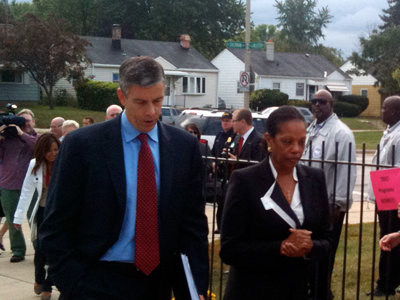You could tell by heavy police presence that something was up at the old Custer High School on Sherman Boulevard this morning.
But, if you didn’t know that U.S. Department of Education Secretary Arne Duncan was coming to visit the School of Career and Technical Education – an MPS charter that shares the building with Barack Obama School – you found out when his tour bus pulled up, in all its painted glory.
Duncan visited the school on the last day of this week’s Back to School Bus Tour, which wraps up in Duncan’s hometown of Chicago this afternoon.
But the police presence was also strong because awaiting Duncan’s arrival inside were Mayor Tom Barrett, Gov. Scott Walker, Sen. Lena Taylor, Sen. Ron Johnson, state school’s superintendent Tony Evers and a range of Common Council members, School Board directors, community leaders, representatives from MPS corporate partners like GE and others.
There was, of course, also a large contingent of MPS bigwigs, from superintendent Gregory Thornton, right on down the line.
Riding along with Duncan was President Barack Obama’s Domestic Policy Adviser Melody Barnes.
What struck me most was that despite his rather commanding presence (he’s fairly tall) and star power, Duncan didn’t really seem to be the star of the show. Of all the pols that spoke, his comments were among the briefest.
During the town hall portion of the event, at which a couple of SCTE students and a few community members asked questions, Duncan replied, but Barnes seemed to answer nearly as often.
Duncan spoke about the Race to the Top competition, saying that he’s looking forward to Wisconsin’s application for the upcoming early education competition for dollars.
I couldn’t tell if he looked over at Walker when he said, “Folks in Wisconsin … have done some things we agree with and have done some things we don’t agree with. I think limiting collective bargaining rights is not the way to go. We need to have all those voices at the table.”
The governor, however, nodded vigorously throughout Barnes’ response to a question about support for early childhood education from WMCS radio’s Earl Ingram.
“We consider those years to be a critical point in a child’s life,” she said. “We’re doing a disservice to our children and to our country when we’re not investing there. It cannot be a babysitting service. We know those are critical learning years. We know we have to invest in those areas.”
Yet, Wisconsin doesn’t fund local districts’ K3 program and some Walker allies, like Republican Sen. Glenn Grothman, even suggest cutting state support for K4 programs. Could the nodding be a sign of a thaw?
In some of the timeliest news of the morning, Barnes and Duncan both spoke of Obama’s address last night which made mention of funds to hire back laid off teachers and to support school construction.
If you read my facilities plan story yesterday, you know that MPS is facing nearly a billion dollars in deferred maintenance on its buildings in the next decade.
If – and certainly that’s an IF, in capital letters – the Obama American Jobs Act was to clear Congress, Barnes said that it would mean not only more than 7,400 teachers brought back across the state, but would have a big financial impact on MPS, too.
“We’re talking about $169 million … on the school modernization side for Milwaukee. And additional resources that would go to other parts of the state. But because of the size of the city, because of the need here, we believe that that will be helpful to make sure that we’re tying the physical, the facility, to what we’re envisioning in terms of a 21st century classroom.”
On a side note, the morning’s most confounding comments for the parent of an MPS student came from Sen. Johnson, who – like most politicians can’t seem to find benefits, beyond economic ones, to support education – called students “products” that schools should be “turning out.”
In the end, the event – at least the Milwaukee stop – seemed to provide a chance for Duncan to shake some hands and remind city districts that “reform” is the buzzword that will get them money and support they need from the Obama administration.
“We want to be a good partner, we want to drive a tremendous amount of change with our resources, but we can’t do it by ourselves at the federal level. We want to challenge everybody to step up to the plate and continue to invest.”
It’s certainly no coincidence that Duncan visited an MPS instrumentality charter, rather than a traditional public school or a non-MPS charter. It makes a statement that the administration is walking a line, pushing charter development while trying to hold on to support from teachers unions and public school supporters.
In his closing remarks, Evers returned to the buzzword and assured Duncan he’d come to the right place.
“I spend a lot of time in Milwaukee and every time I go over the hill to head into Milwaukee I almost feel the energy from Dr. Thornton from Vliet Street,” said Evers, who talked about district-wide reading and math curricula, a large reduction of suspensions and, among other things, a data system he said was one of the best in the country.
“Sec. Duncan, I want to give you a little heads up, the leadership that Dr. Thornton has is hell-bent on a reform agenda. There is no question about that.”


 i evaluate to yes even if there's no image
i evaluate to yes even if there's no image  i evaluate to yes even if there's no image
i evaluate to yes even if there's no image  i evaluate to yes even if there's no image
i evaluate to yes even if there's no image  i evaluate to yes even if there's no image
i evaluate to yes even if there's no image  i evaluate to yes even if there's no image
i evaluate to yes even if there's no image  i evaluate to yes even if there's no image
i evaluate to yes even if there's no image 